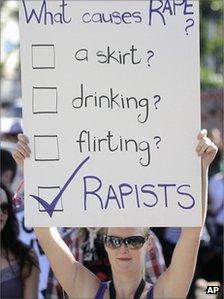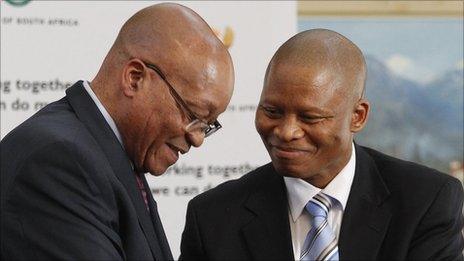Do men hold the key to fighting rape in South Africa?
- Published
BBC News spoke to Ronnie and Phikelele, who have been taking part in the Men Against Violence workshop
"How many of you here have ever raped a woman?"
After a short silence two men gingerly raise their hands.
In towns and cities across South Africa, small groups of men, some of them confessed rapists, are meeting to talk about sexual violence, as part of a small but significant challenge to their country's notorious record on rape.
This workshop is gathered at a sports centre in the deprived Johannesburg township of Alexandra.
"Most men are silent about this," says Dumisani Rebombo, who is leading the workshop organised by the One Man Can Campaign.
But it is "vitally important" for men to play their part in tackling the rape crisis, he says.
Just as the participation of white people in the black struggle against apartheid in South Africa had added strength to that movement, men "must stand up and work with women" to combat rape, he told the BBC World Service.
"Do you think women are raped in our country because of wearing short skirts?" Mr Rebombo asks the group.
They reply with a mix of Yes and No - the Yes group a little louder than the other.
"Rape is about sleeping with a woman without her consent and I have done it," admits one of the men, 33-year-old Phikeleli.
"By coming here I have had the opportunity to sit down with other men and to discuss the issue of 'No is No' - and to understand exactly what rape is," he adds.
Another man told the BBC about a gang rape of a woman in his neighbourhood.
"The community said that she deserved it... It happens so often that it is not taken seriously by the community - it's a norm to them."
Though South Africa's murder rate has now fallen to its lowest level in recent years, rape is still on the increase, according to the latest official crime figures.
More than 56,000 women reported having been raped during the 12-month period to March 2011, police say. Many more cases are believed to go unreported.
Justice and society
Earlier this month President Jacob Zuma infuriated activists and many of the country's top lawyers by appointing an ordained pastor with controversial views on rape and homosexuality as the country's chief justice.

The workshop is trying challenge some of the root causes of rape
Judge Mogoeng Mogoeng, now South Africa's most senior judge, has denied he was insensitive to rape.
In 2004, however, he reduced the sentence of a man convicted of raping a seven-year-old girl from life imprisonment to 18 months, the minimum.
And a year later, he reduced the jail sentence of another man who attempted rape from five to two years.
In an interview with the BBC World Service, South Africa's Minister for Basic Education, Angie Motshekga, denied the authorities were doing too little to tackle the crime.
The rate of rape cases is "unacceptably high," says Mrs Motshekga.
But she says "the decadence in our society" is to blame, not the government.
"Kids come to school with social stereotypes, which are reinforced at home, in society, in the church - everywhere they go. It is a social problem."
"How many people we arrest isn't the solution, it lies with socialisation and our country's value system."
Saying sorry
Dumisani Rebombo is himself a confessed rapist who went one step further by seeking out his victim years later, in order to ask for her forgiveness.
He was 15 years old when he and another boy raped a girl in their village - "in order to teach her a lesson".
He said it took him 20 years to realise what he had done was wrong.
"It dawned on me that I had to find this woman," he said.
When they met, he apologised and she broke down in tears.

Dumisani Rebombo was racked by guilt after raping a woman
Three years later, he began organising workshops to talk about how to stop other men raping women.
"I would say all men have in one way or another raped," says Ronnie, a former convict and another member at the workshop.
Many of his fellow inmates were in jail for rape attacks.
"It's not easy for them to accept what they did was wrong," he says.
"It's all about power - men believe they have the right to do as they please."
The issue of rape in South Africa was discussed on a special edition of the BBC World Service programme Newshour hosted by guest presenter, South African radio talk show host Redi Tlhabi. You can listen to the programme here.
- Published8 September 2011

- Published30 June 2011
- Published18 November 2010
- Published9 July 2024
